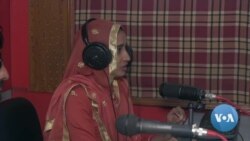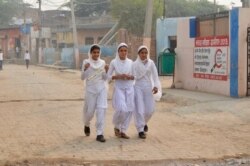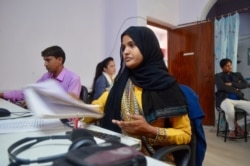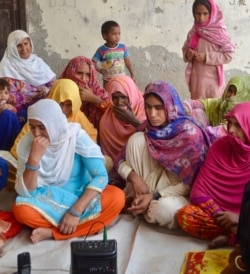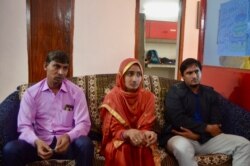When 21-year-old Fareen welcomes listeners to Radio Mewat, thousands of women tune in to programs that focus on women's issues, especially one on domestic violence.
This young radio announcer is a rare exception in the Muslim-dominated, patriarchal villages that dot Mewat district in northern India, where women are not allowed to work, be seen with men or even be heard. It took months for her to overcome her family's resistance and join the community radio station.
"The villagers told them, 'Why are you not marrying your daughter? She is so old. Who will marry her if she takes a job?' " she recalled. "My parents questioned how I could possibly work alongside men."
Since last year, the radio station in one of the country's most backward districts has tackled issues such as dowry harassment and domestic violence — an endemic problem in the approximately 170 villages in Haryana's Mewat district where the radio station beams its programs.
Fareen, who uses just one name, is the voice that reaches out to women and demonstrates that change is possible.
Like a time warp
Lying just 100 kilometers from New Delhi, one of the country's most underdeveloped regions is virtually stuck in a time warp — most girls do not complete school, they are married young, and barely 10% of homes have a television, which many here consider against the tenets of their religion.
Two years into her job, Fareen considers herself lucky compared with other girls her age. "Thank God I did not get married," she said. "Some of their husbands don't earn; some have deserted them. I tell them to tune into our program. 'We can help you. We can file court cases or try mediation.' "
That message is not confined to the studio. Riding with a male colleague on a motorcycle — something unheard of here — Fareen visits villages armed with a narrowcaster — radio equipment used to reach a small group. Women gather around as she plays real-life stories of women who found the courage to relate their woes on air.
In Ferozpur Namak village, they listen attentively to how Zeenat, 25, whose husband deserted her, went to court and won a $ 200 settlement. She has returned to her parents' home to live with her three young children.
Gained support
"I got courage after listening to the program on women's violence," said Zeenat, who also uses just one name. She wept as she heard her own tale being related. "When I told my story, they told me how I could take a stand."
Emboldened by the step Zeenat took, another victim of domestic violence began relating her story.
It took six months for women to start opening up after the program on domestic violence went on air in January last year. Since then, nearly 100 women have filed cases and taken action against their husbands — harassment for dowry is the most common problem here, according to Sunita Mishra, a senior reporter at Radio Mewat.
Elderly women in the village are optimistic this will act as a deterrent to other men as women begin to realize that they are not helpless.
The radio is becoming a medium of expression for many women, according to Archana Kapoor, who launched Radio Mewat and SMART, a not-for-profit organization whose team of social workers has worked in the area.
The explosive growth of mobile phones in recent years has helped widen the radio's reach as women borrow phones from their husbands or sons to tune in to programs.
Valuable medium
"For women it has been a hugely empowering process because radio is something which gives you privacy, it gives you anonymity, and it gives you information," said Kapoor. "It has given an identity to the people. It has given them control of a medium where they are the listeners, they are the producers."
Programmers at Radio Mewat also help women and the wider community learn about subjects such as livelihoods, health and education.
Mohammad Arif and Saurabh Khan run programs that focus on inspirational stories of local youth. Arif focuses on how some overcame adversity and poverty to educate themselves, while Khan showcases success stories of local people who earn decent incomes through small businesses, whether it is as shop owners or carpenters.
Change is happening, but slowly. For example, one of the biggest challenges at Radio Mewat is to hire and retain women — out of 12 employees, only three are women. Parents refuse to send girls who are not married.
"How will they allow her voice to be heard on radio?" station manager Komal Sharma pointed out wryly. "This is a district where a woman's voice should not even reach the neighbor's home."
Efforts to rope in those who are married have also not been easy. "We employed a couple, but when their husbands walked in and saw them having lunch with male colleagues in the team, they took them away," Sharma said.
How long Fareen will continue working remains to be seen. But getting into the studio at Radio Mewat has brought her close to her childhood dream of becoming an actor. And her work here has inspired a new goal.
She wants to get married in the same district where she has grown up, but she is determined to stand apart from other women. "I want to bring change into whichever family I marry," she said. "Their girls should go to school. And women who are abused should get justice."
For this community radio, the challenge is to find more girls like Fareen to demonstrate that it is possible to break barriers and transform life.




